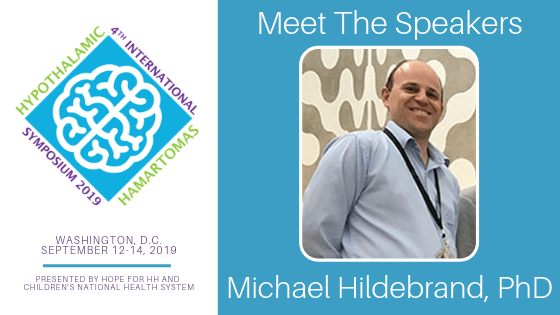
Hope for HH is co-sponsoring the 4th International Symposium on Hypothalamic Hamartomas – a professional symposium for HH investigators, clinicians and researchers – in Washington DC Sept. 12-14. The Symposium aims to identify gaps in understanding and opportunities for future HH research studies and collaborations to improve diagnosis, treatment and care of both the seizures as well as the other endocrinological and neuropsychological symptoms.
In this blog series, we will introduce you to several internationally recognized clinicians and researchers who are thought leaders both inside and outside of HH and who will serve as facilitators, presenters and discussants at the Symposium. Highlights of the Symposium will also be available to the HH patient and professional community following the meeting.
Meet Dr. Michael Hildebrand
Please meet Dr. Michael Hildebrand who is a molecular geneticist working with Dr Samuel Berkovic, MD at the Epilepsy Research Centre at the University of Melbourne. Together we conduct phenotypic and genotypic analyses of a large cohort of 85 HH patients from surgical centres at the Royal Children’s Hospital in Melbourne and the Barrow Neurological Institute at the Phoenix Children’s Hospital.
Dr. Hildebrand will be presenting during the 4th Session titled “HH Research Updates & Opportunities” on the topic of Genetics of HH. We are especially excited to have up and coming investigators take an interest in HH and epilepsy and carry the research torch forward.
What is your specialty training and background?
Dr. Hildebrand completed his PhD in late 2006 (University of Melbourne). He heads the Translational Neurogenetics Laboratory in the Epilepsy Research Centre at the Melbourne Brain Centre, Austin Hospital. The focus of my research is to understand the basic neurobiology of human epilepsy, speech disorders and deafness, and translate this knowledge into improved treatment of patients
How did you become interested in HH research and care? What are your contributions to the HH field of research and care?
My interest in HH stemmed from our work trying to understand the contribution of somatic mutations to brain malformations associated with epilepsy. In the 2016 meeting in London I presented on our break-through research showing through a series of genetic analyses that HH is a ‘brain pathway disease’, implicating at least 17 genes from within or related to the sonic hedgehog signalling pathway. This work resulted in the molecular diagnosis of 14 new HH cases, ending the diagnostic odyssey for these patients and their families, and informing their clinical management and counseling. We are indebted to the foundation and the many families and patients involved in our research for these findings which were reported in the American Journal of Human Genetics (Hildebrand et al 2016 99:423-9).
The Symposium is important because
At the 2019 Hope for HH Meeting genetic contributions to HH will again feature. The timing of the meeting is perfect because we have been working hard to expand our understanding of the genetic architecture and have recently extended this to another important developmental gene pathway already associated with neurological phenotypes (diseases of the nervous system). As part of this work we have already achieved a molecular diagnosis in two additional HH cases and I recently reported on these new findings to the Hope for Hypothalamic Hamartoma board and families at the American Epilepsy Society Meeting 2018 in New Orleans. We are now interrogating other pathway genes seeking additional diagnoses. By the September 2019 meeting I hope to be able to report on a more complete picture of the contribution of this new pathway to HH.
Outside of work passions
I am a massive sports fan. I played Australian Rules Football and Cricket, and remain an avid fan taking both my children to professional games. I also tailgated at Iowa Hawkeye football games and was a big Colts fan during my five-year postdoc in the United States.
Call to Action
Like to share your feedback about the Symposium, speaker or topic, please send your comments to info@hopeforhh.org.
Would you like to support the Symposium and research with a donation to Hope for HH? Click here to Donate.





